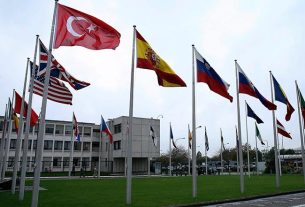ROME — Italy’s recent establishment of migrant processing centres in Albania has sparked controversy, with human rights groups and analysts deeming the move both contentious and potentially illegal. This week, the Italian government announced it would appeal a court ruling that blocked the initial phase of its offshore migrant project.
Prime Minister Giorgia Meloni, addressing Parliament, described the deal—signed in November 2023 but activated this week—as a “courageous” step. The five-year agreement allows for the transfer of up to 3,000 migrants each month, rescued by the Italian coast guard in international waters, to Albania for asylum processing.
Meloni’s administration claims that this strategy will combat human trafficking and facilitate legitimate asylum claims within the EU. However, a recent ruling from a special immigration court in Rome declared the transfer of 12 Egyptian and Bangladeshi migrants to Albania unlawful, ordering their return to Italy on the grounds that their home countries are not safe for repatriation.
Kelly Petillo from the European Council on Foreign Relations expressed scepticism regarding the plan’s success, noting significant political division and the lack of positive outcomes so far. She pointed out that other nations, observing Italy’s approach, might reconsider similar initiatives, particularly after the UK backed away from its contentious Rwanda asylum plan.
Opposition parties in Italy quickly condemned the Albania plan following the court ruling, calling for its cancellation. Despite this, Meloni’s government intends to challenge the decision, suggesting revisions to existing laws.
European Commission President Ursula von der Leyen acknowledged the potential lessons from Italy’s migrant processing centres, as EU leaders convened in Brussels to discuss stricter migration laws and quicker returns. Concerns persist, however, regarding the alignment of such measures with foundational EU values.
Activists, including Elisa DePieri of Amnesty International, voiced apprehensions that the plan could lead to prolonged detentions and undermine the right to seek asylum. “Automatic detention from the outset is arbitrary and unlawful under international law,” she warned.
Davide Colombi, a researcher at the Center for European Policy Studies, highlighted that the right to asylum is a fundamental principle protected under EU and international law, suggesting the issue extends beyond migration to broader rule-of-law concerns.





